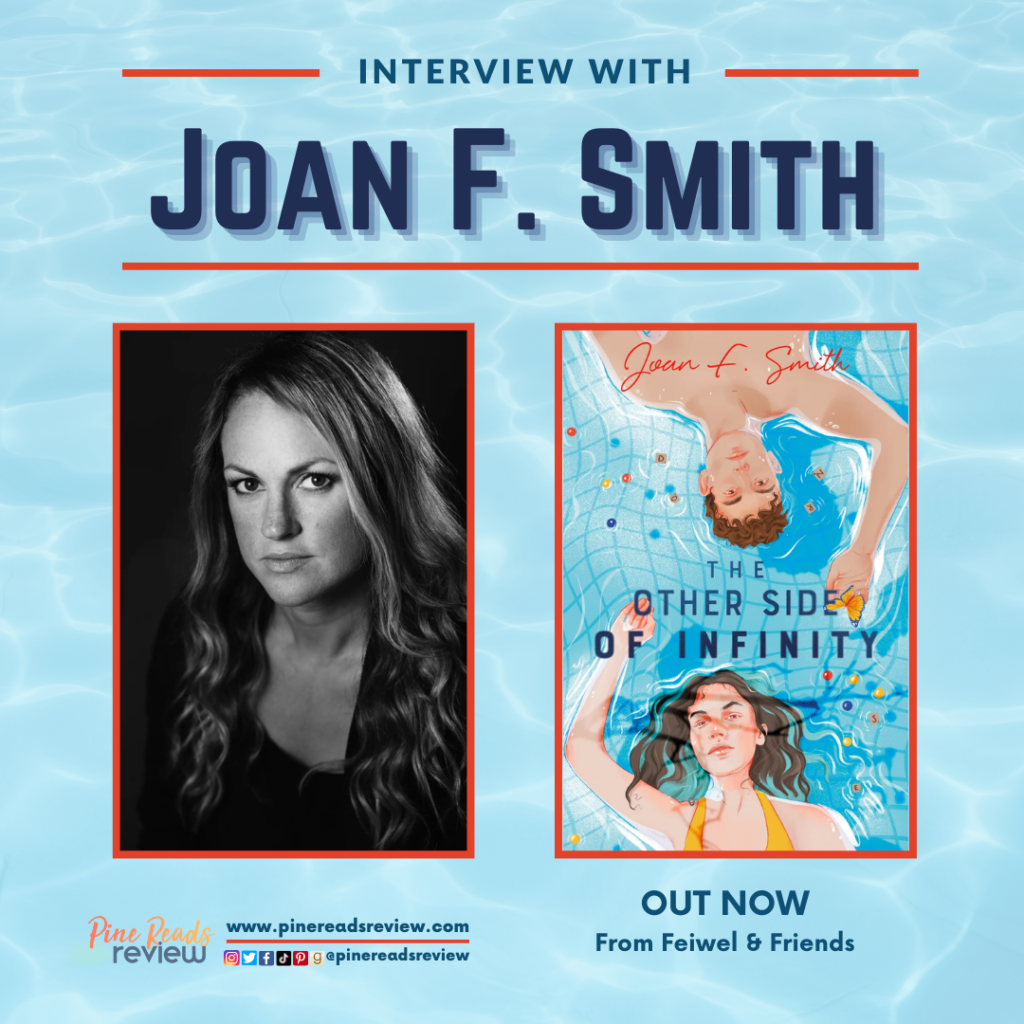
About the Author: “Joan F. Smith is the author of The Other Side of Infinity and The Half-Orphan’s Handbook, a dance instructor, and a former associate dean of creative writing. She received her MFA in Creative Writing from Emerson College. Joan lives and writes in Massachusetts, where she was the 2021 Writer-in-Residence at the Milton Public Library. When she’s not writing, she’s either wrangling her kids, embarking on a new hobby she will quickly abandon, or listening to podcasts on a run” (Bio from the author’s website).
Find Joan F. Smith on the following platforms:
Joan F. Smith: I actually wrote this novel before The Half-Orphan’s Handbook even sold! This book was written as a pivot from THOH. I wrote it while my debut was out on sub. I’d say my first book taught me that I really am a planner, and all subsequent books have confirmed this.
JFS: I’m so drawn to topics and questions that we can’t answer. It’s definitely cliche, but it’s a part of the human condition to wonder how our actions impact others. Teens are so much smarter than a lot of people give them credit for. One person I talked to at the beginning of developing this story told me the themes I was planning to tackle would be “over the heads of teens” which I found incredibly offensive and helped me chug along with writing this.
JFS: I did loads of research on multiple-POV novels before I jumped into drafting this. The best tip I found was that you had to think about the lens with which each character viewed the world. Nick is dyslexic and a lot of the way he thinks is in “shapes” — there’s a ton of hidden geometry in his way of thinking (how he describes the pool is a good indicator of this) which somewhat aligns with how my brain works. Having a character who can see the past, present, and future also lended me a natural cheat code in developing December’s voice as distinct from Nick’s. One of the last rounds of revision I did involved reading their POVs all at once (all the December chapters followed by all of Nick’s) to make sure their voices were cohesive and separate.
JFS: I love these questions. Yes, the ending is unchanged from the story idea’s initial conception. Very careful readers may find three distinct pieces of foreshadowing for the plot twist throughout the book, plus a handful of others that made their way in during future rounds. The person who screens my Goodreads reviews for me said that there is one major foreshadowing element people haven’t written about yet, but I did get DMs from two people who have. As for how she developed the powers: that is a very deliberately withheld item of information, but a handful of people on earth know the answer.
JFS: I find that despite the best intentions of most teachers, the way our curriculum assesses students is not indicative of intellect. There were so many brilliant people I went to school with who didn’t score well on tests, because the curriculum attempts to target the bigger bucket of learners, which means lots of people in my life have been left feeling like they weren’t smart enough because one or ten tests confirmed it for them. I later worked in curriculum design, which helped me rebound my thinking when it came to different ways we could address the needs of a number of types of learners instead of one “standard.” I LOVE teachers, and I think generally speaking, public school curriculums have a long way to go before they allow the sort of flexibility we should be fostering in students. Especially when it comes to standardized tests.
JFS: Maverick was always my favorite guy to stumble on in the revision process, and in the writing one, too.
JFS: I’d say I don’t love writing it “as opposed to,” but more “alongside of” other genres. There are few times in life that are as pivotal as the teenage years, and I like writing about pivotal time periods.
JFS: I sure do! Wrapping a draft of an adult novel now, revising a different one after that, and then finishing my third YA! Thank you so much for having me.
PRR Assistant Director, Emma Watts
PRR Writer & Social Media Manager, Kelly Marry